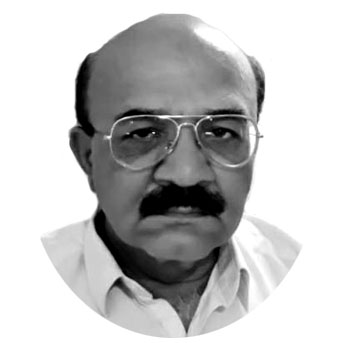Dr Irfan Raja
THE 70-year-old Kashmir conflict was once again a part of the United Nations General Assembly’s agenda in
New York. Since the “abrogation of Jammu and Kashmir’s special status” on August 5, millions of Kashmiris have been living in the world’s biggest concentration camp. One could call it genocide or a planned ethnic cleansing and it must be stopped. But the question is, is it possible? And at what cost? A full-scale nuclear war or a limited conventional war? In any case the consequence of the conflict will be rivers of bloodshed. Are international and regional powers serious in their intentions to halt this possible nuclear war between the two arch-rivals Pakistan and India. Only time will tell, but until now, the international community has been quiet on this front. On one hand, President Donald Trump assured Prime Minister Imran Khan that America is ready for mediation over Kashmir. On the other hand, the Modi-Trump Houston rally indicates that the US supports the Indian stance over Kashmir, despite horrific human rights violations. It’s a pity that the world leaders at large are not only silent over the human rights abuses in Kashmir but many, including Bill Gates, Donald Trump and Mohamed bin Zayed Al Nahyan have presented the Indian Prime Minister Narendra Modi with some of the highest awards of their organisations and countries.
This scenario shows that in the real world it is in fact the economic and political interests of the nations that matter, and not the basic human rights of Kashmiris. Today, arms export is a major business for Britain, America, France, Russia and China that are all key players in UN Security Council, an institution that is supposedly ensuring peace. According to a report titled: The Good, the Bad and the Ugly Britain has sold deadly weapons to both India and Pakistan at the height of tension over Kashmir. The same report disclosed Britain’s ambitions to arm Israel for decades, despite Israel persistently violating human rights in the Gaza Strip. According to the Guardian report, the British government continued to supply arms export to India and Pakistan, “despite guidelines saying it should not sell weapons to countries in unstable regions and where they might exacerbate existing conflicts”.
Perhaps this is why Britain refused to address the Kashmir conflict. Take Britain’s core value, human rights that it often uses to cover its illegal wars and interventions in the Muslims lands but at the same time silent over thousands of rape cases, illegal detentions, lynching’s and series of attacks on Muslims’ properties in India. So who will stop India? Is this not a terrorism? The United Nation Security Council Resolution 47 that authorises the people of Kashmir to decide their destiny in a plebiscite is a long awaited UN promise to the people of Kashmir. Will the UN reinstate its decades old Promise to Kashmir? What happens if it fails again? Can we afford a nuclear war over Kashmir? Too often, the western media and polity sees Kashmir as a territorial and a bilateral issue between India and Pakistan. The fact of the matter is that is not a territorial issue, but rather a forgotten promise to the Kashmiris, that they will decide their own destiny through a ballot; their fate was not to be decided by India and Pakistan. So far, the United Nations Security Council has enormously disappointed Muslims on several issues including Palestine, Kashmir, Iraq and Syria. The UN was quick to respond to the East Timor and Rwanda crisis but it is reluctant to retort to the humanitarian crisis in Kashmir and Palestine and other places.
President Erdogan believes that there is not a single permanent Muslim member in the UN Security Council itself. This testifies a disparity in representation, when one considers that there are 1.7 billion Muslims worldwide. The organisation has especially lost the trust of Muslims around the globe. Today, millions of Muslims are forced to live in concentration camps across India and China. The Indian government often reminds us that India is one of the world’s oldest democracies, yet it has stripped millions of Muslims in the State of Assam of their citizenship. What kind of supposed democracy would allow such discrimination to take place? The UN Security Council that is supposed to prevail peace in the world is continuously failing. Carne Rossasks a pertinent question: “The UN is failing. Is it heading the way of the League of Nations?” Its past experience shows that Ross could indeed be right, since it has mostly failed to halt wars and covert operations in the Middle East, Asia and Africa. The UN and the international community needs to act quickly to address Kashmir conflict before it turned out to be full-scale war, which will threaten not only the masses of India, Pakistan and Kashmir, but could also put global security and the UN’s already fragile reputation at stake.
—The writer is a British-Pakistani political analyst and a human rights activist.










